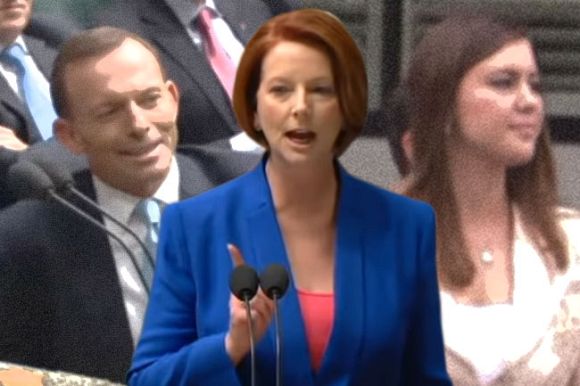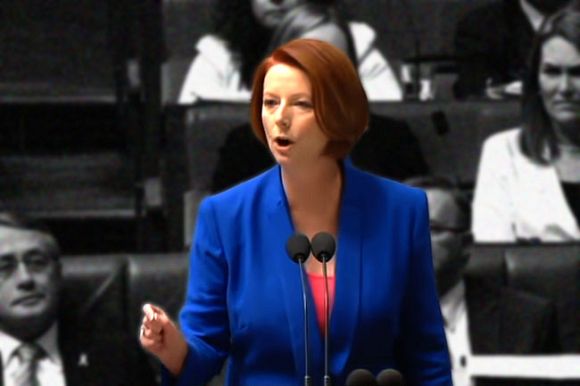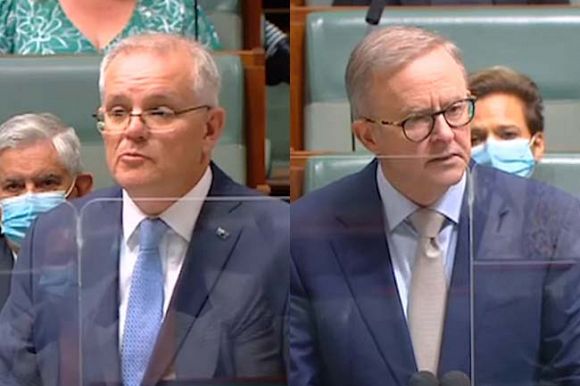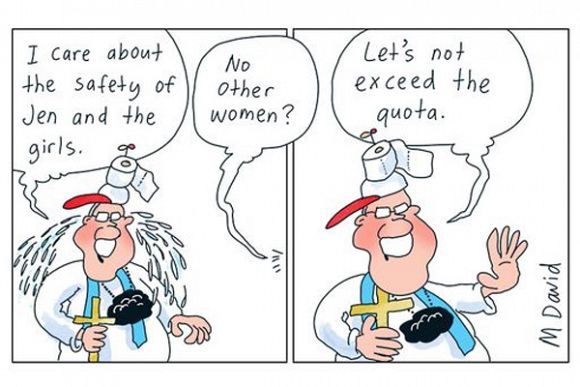Following Julia Gillard's historic Misogyny Speech, coverage in the press demonstrated a detachment from the true meaning behind her words, writes Dr Victoria Fielding.
AS I LISTENED to former Prime Minister Julia Gillard speaking about her experience of giving one of the most famous Australian political speeches of all time – the Misogyny Speech – I thought about how this speech has not only become a historic legacy for Gillard and for Tony Abbott, but also for the Australian media.
In Gillard’s recently released book commemorating the ten-year anniversary of the misogyny speech – Not Now, Not Ever – The Guardian’s Katharine Murphy describes how journalists reporting the speech missed its ‘cultural power’ and discounted its essence. Instead, she says, they framed it as merely the ‘theatre of battle’ in Parliament, resulting from journalists’ detached style of reporting, also referred to as ‘both sides-ism’ and what Murphy calls ‘the root of journalistic authority’.
I appreciate Murphy’s acknowledgement that journalists like herself and other women – she names Samantha Maiden, Laura Tingle and Karen Middleton – are far more willing these days to un-detach themselves from issues of gender politics, using their own voices to find a ‘new way of speaking’ rather than reporting passively using a ‘generic, genderless, formulaic journalistic voice’. Change is welcome.
Yet, at the same time, this acknowledgement from Murphy that the detached style wasn’t the ideal way to report the historic Misogyny Speech, begs some serious questions. The first is, if the media cannot collectively report a historic political event correctly while watching it unfold, how can we trust them to report any event accurately? It wasn’t just the significance of the speech that they missed, but the significance of the years of misogyny Gillard experienced in the lead-up to it. Even those who admitted to seeing the sexism chose not to say anything, for fear of taking sides.
The other elephant in the media room is that journalists were not detached from a perspective in reporting the Gillard speech. They took a position, critiquing it as “just politics” and that position was wrong. Wrong, but not detached. What they were detached from, on the other hand, was the audience’s response. They not only showed they were disconnected from the millions of Australian women who were immediately moved by Gillard’s statement, but showed condescension towards the audience by claiming they knew better.
An exploration of newspaper reporting of the inadequate and frankly offensive misrepresentation of the Misogyny Speech demonstrates these glaring problems.
The most insulting take that first day, 10 October 2012, came from the Sydney Morning Herald’s Peter Hartcher, who criticised Gillard for defending her ‘parliamentary numbers’, saying in doing so, Gillard ‘gained nothing and lost a great deal’. Hartcher called the Misogyny Speech an example of the Prime Minister’s flawed judgement and said it caused her a ‘serious loss of credibility’. Is this really a detached reporting style?
That same day, in a classic case of the both sides-ism named by Murphy, The Australian’s Sid Maher referred to the speech as part of a ‘sexism brawl’. Steven Scott, in the Courier Mail, said the speech occurred in a ‘torrid day in Canberra’. Both sides as bad as each other. This is not detached — it is inaccurate.
Some reporters started to sense the significance of the speech when they realised the audience was responding positively to it, both in Australia and internationally. The fact that an event must go viral before journalists recognise its significance is more than a little concerning. For instance, on 11 October, Michelle Grattan said, ‘Angry Julia has taken off like wildfire in the overseas media and blog world’, suggesting these worlds are separate from the world of politics in Australia. Jacqueline Maley, in the Sydney Morning Herald, suggested there might be a ‘net benefit’ to Gillard as she ‘glowers across the globe’.
Yet on the same day, Andrew Bolt in the Daily Telegraph slammed Gillard for trying to ‘cling to office’ by calling Abbott sexist, saying that this was shameful, that ‘Power is this woman's true passion’ and that her suggestion Abbott is misogynist is a ‘ludicrous non-sequitur’. Slipping back into the both sides-ism frame, Lauren Wilson at The Australian referred to the aftermath of the speech as ‘an acrimonious political battle about who is more misogynistic than who’.
Again, showing a distinct lack of detachment while also patronising the audience, Michelle Grattan in The Age on 12 October wrote a piece titled ‘Gillard's betrayal of feminism’, saying ‘The PM may have made a hero of herself to some feminists but she did the wrong thing in trying to protect the sexist Peter Slipper’.
On day three, in a similarly demeaning example of a journalist watering down the audience’s profound reaction, Lenore Taylor, then at the Sydney Morning Herald, acknowledged that the speech did ‘stir hearts’, but only if you forgot the context. Taylor then context-splains that the speech was actually ‘a deliberate, tested strategy of capitalising on the Coalition's relative unpopularity with women due to Tony Abbott's political aggression by conflating it with the unsupportable allegation that he actually hates females’.
Yes, Taylor really wrote that.
Even when coverage accepted the speech was widely resonating with the public, Australian journalists and commentators claimed they knew better. On 13 October, the Canberra Times editorial opinioned that the ‘so-called ''gender war''... represents a misjudgment’, making Australian politics a ‘worldwide spectacle’ and represented a ‘battle Gillard cannot win’.
Laurie Oakes reported the speech had an impact on women, but there was truth in former Liberal Leader John Hewson’s assertion that it was a great speech but “I gather the band played pretty well as the Titanic went down as well”. How’s that detachment going? And Chris Kenny in the Weekend Australian characteristically called the speech a ‘gender tack’, an example of ‘Gillard's hypocrisy stripped bare’ and the actions of a desperate Labor Government.
By 14 October, there were two commentators who began to assert the success of the speech. They included Charles Waterstreet in the Sun Herald Extra who said the speech was Gillard’s ‘big guns blazing’ and ‘every bullet went into the head and heart of Abbott’, while Mia Freedman in the Daily Telegraph finally pointed out that this was not ‘about politics… This was a blistering take-down of sexism’.
Michelle Grattan seemed keen to kill this idea, thinking it was a good time to write a piece about Gillard’s ‘man problem’, writing, ‘Julia Gillard doesn't have enough men in her life. Male voters, that is’. There is nothing detached about that choice of topic.
The next day, Simon Benson in the Daily Telegraph wrote a piece implying Gillard was a ‘sexism hypocrite’ and quoted then Greens Leader Christine Milne as saying the sexism debate had ‘diminished the Parliament’ so the Greens decided ‘we didn't want to get dragged down into it all’.
Former Liberal MP Alexander Downer was also given column inches in The Advertiser to criticise Gillard’s ‘whinging’, arguing that Thatcher never whinged about sexism and that women just have to accept that men say ‘sexist or smutty’ things all the time so what’s the big deal?
The next mention of the speech came on 17 October, but only in relation to an editorial in The Australian titled ‘No need to be coy, Ms Gillard’ (her title was Prime Minister), which argued that Gillard’s failure ‘to express abhorrence for alleged misdeeds’ risked those misdeeds coming ‘back to bite her’.
Michelle Grattan in the Sydney Morning Herald, in no way detached, wrote half a piece about Gillard tripping over during a visit to India, writing ‘Ms Gillard has a history of embarrassment with apparently loose shoes and difficult heels’, then mentioning halfway down that despite all the footage of her fall, she has received positive feedback in India for her ‘combative speech’. All the way in India, audiences saw what Australian journalists did not.
This Misogyny Speech coverage is a sad and embarrassing legacy for the Australian media, a legacy I hope they eventually make efforts to reckon with. The same names that you see in bylines ten years later, can make all the justifications they like about what went wrong.
But the fact remains, an insider detachment born from media routines was not to blame here. There was nothing neutral or passive about the way the media failed to report this historic moment. The only detachment I could detect was a detachment from the lives of the audience and let’s face it, a detachment from reality.
Has anything really changed in the media since then?
Dr Victoria Fielding is an Independent Australia columnist. You can follow Victoria on Twitter @DrVicFielding.
Related Articles
- Manipulated collective memory makes most Australians much poorer
- Press Council refuses to investigate The Australian over multiple falsehoods
- Another fine mess Australia's media has gotten us into
- Christmas 2013 — post-Apocalypse
- Last call for Julia Gillard
 This work is licensed under a Creative Commons Attribution-NonCommercial-NoDerivs 3.0 Australia License
This work is licensed under a Creative Commons Attribution-NonCommercial-NoDerivs 3.0 Australia License
Support independent journalism Subscribe to IA.
















